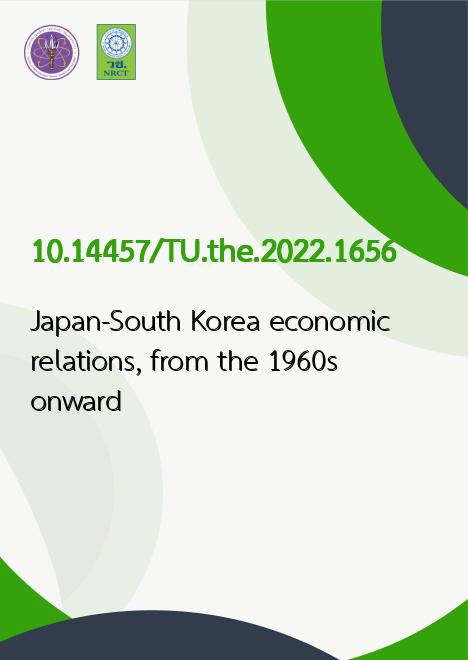
|
Japan-South Korea economic relations, from the 1960s onward |
|---|---|
| รหัสดีโอไอ | |
| Title | Japan-South Korea economic relations, from the 1960s onward |
| Creator | Punthita Seksarn |
| Contributor | Sunida Aroonpipat, Advisor |
| Publisher | Thammasat University |
| Publication Year | 2565 |
| Keyword | Japan, South Korea, Economic relations, Identity, Perception, Interaction, History, Nationalism |
| Abstract | Based on realist perspectives, if Japan and South Korea are rational actors and strategically think about their national interests, their relations should be undoubtedly cooperative. The two countries share similar political ideologies, embrace Western values, and have a common security threat of North Korea. Regarding their interests, the relations could be developed. In a similar way, liberals would envisage the interdependent form of the economic relationship between Japan and South Korea. As of their institutional arrangements, democratic values, and economic conditions, both countries’ cooperation in certain aspects should be inevitably formed.The constructivists would argue that identity, perception, history, and interaction between the two countries have played essential roles in Japan and South Korea economic relationships. It must be noted that history becomes one of the factors that has an impact on the other three factors which are identity, perception, and interaction in some periods. On the contrary, history would not act as a factor when historical matters are not raised by either or both sides in a certain time.Recently, Japan and South Korea have had a disagreement over a treaty related to history. As this incident eventually led to economic issues such as the removal from the ‘whitelist’ and the bilateral trade war, this topic drew the public’s attention.This independent study is about how Japanese and South Korean national identities, perceptions, and interactions, influenced by history in some periods, impact the two countries’ relationships. Hence, the study applied the constructivist international relations theory to explain how these factors determine their economic relationships since the 1960s.This research was conducted by the qualitative method and the collection of secondary data from various credible sources, including the economic statistics of Japan and South Korea from the 1960s onward. From a constructivist viewpoint, it was found that Japanese and South Korean identities, perceptions, interactions, and histories in some periods are the factors that shape their economic relationships. For Japan, the rise of Japanese nationalists seems to lately play an increasing role in Japanese politics which influences their identity, perception, and action. In addition, South Korea found other alternatives in terms of markets and economic partners. Korea started to reduce its economic dependency on Japan and direct to a globalized economy. More importantly, historical matters have been significantly raised by either or both countries in some periods; this affects the identities, perceptions, and interactions of Japan and South Korea until the 21st century. From the perspective of this study, it argues that the identities, perceptions, and interactions of both nations which have also been impacted by historical elements in some periods support their behaviors and actions and later determine their economic relationship. |